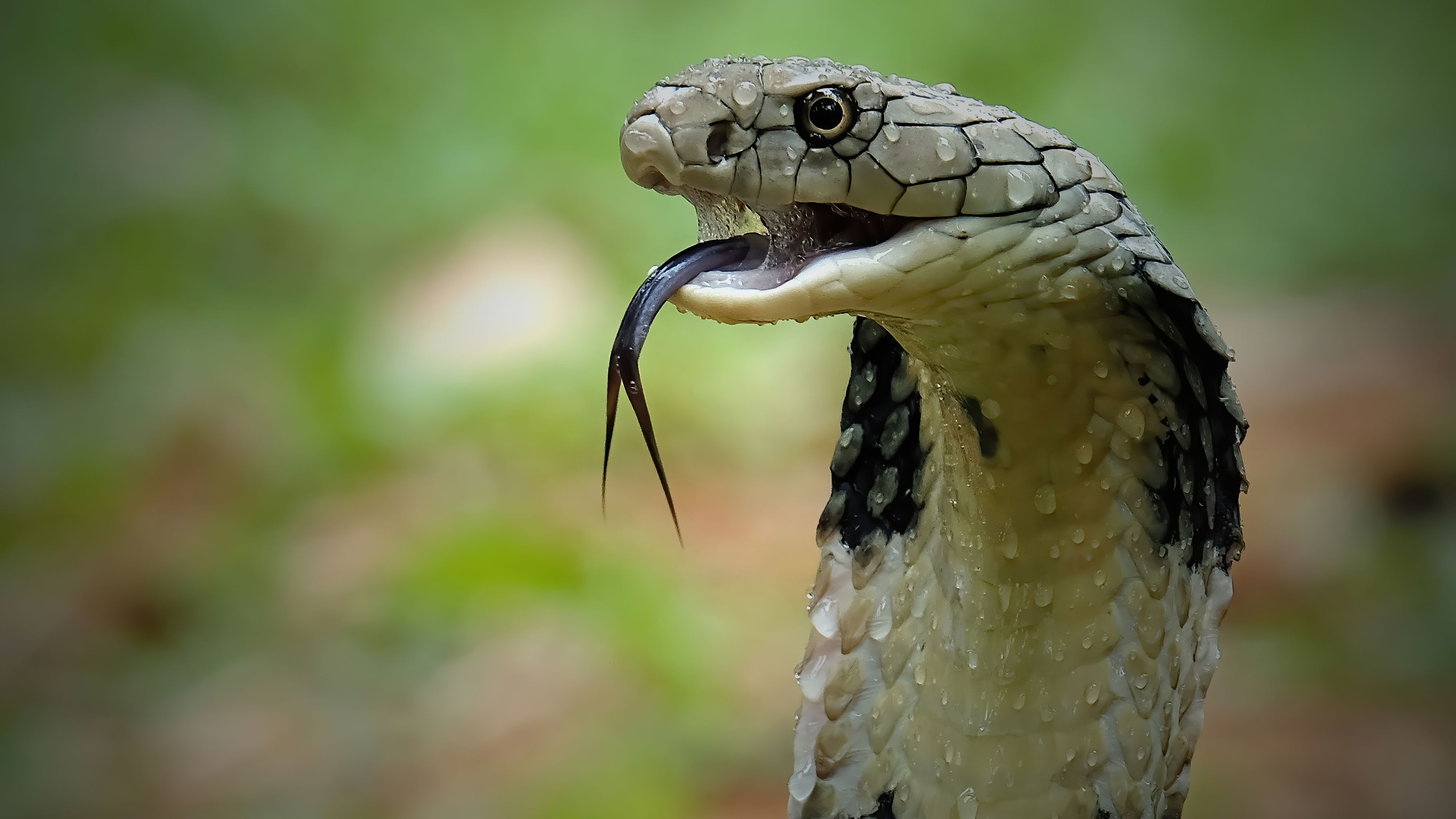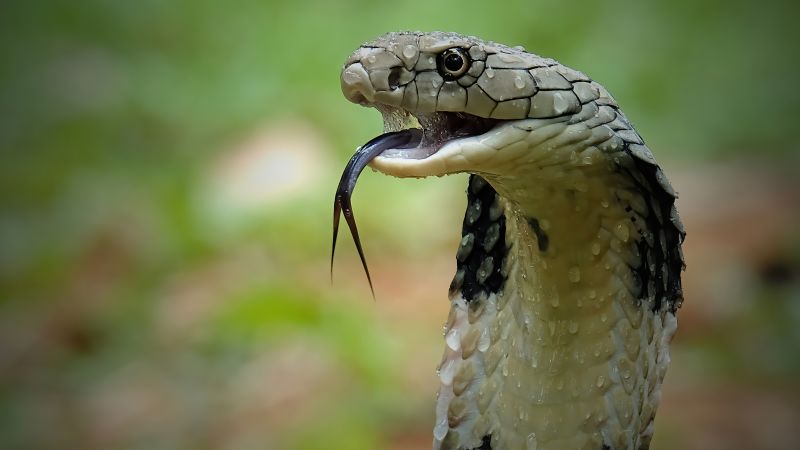The King Cobra is one of the deadliest snakes on the planet, with venom so lethal it can kill an elephant in just a few hours. But what happens if a human is bitten? Can they survive the venomous strike of this deadly predator?
Many myths and legends have been built around the King Cobra’s bite, but the truth is that survival depends on various factors, such as the amount of venom injected, the victim’s age, weight, and overall health, and the promptness of medical attention. In this article, we’ll explore what happens when a King Cobra bites a human and how to increase your chances of survival in case of an encounter with this venomous reptile.
Surviving a king cobra bite is possible, but it requires immediate medical attention. The venom of a king cobra is highly toxic and can cause paralysis, respiratory failure, and death. If bitten, stay calm and seek medical help immediately. Do not attempt to suck out the venom or cut the wound. Applying a tourniquet is also not recommended. Remember, prevention is always better than cure. Avoiding contact with king cobras and other venomous snakes is the best way to prevent a bite.

Can You Survive a King Cobra Bite?
King Cobras are one of the deadliest snakes in the world. These venomous snakes are found primarily in the forests and plains of Southeast Asia and India. Their venom is highly toxic and can cause death within a few hours if left untreated. In this article, we will explore if it is possible to survive a King Cobra bite.
Understanding the Venom of King Cobra
King Cobra’s venom is neurotoxic, which means it attacks the nervous system of the victim, leading to paralysis. The venom also contains cardiotoxins that attack the heart muscles, leading to cardiac arrest. The venom is so potent that even a small amount can be fatal for humans.
If a person is bitten by a King Cobra, the venom can spread rapidly through the bloodstream, causing severe pain, swelling, and tissue damage. The victim can also experience difficulty in breathing, dizziness, and nausea.
Treatment for King Cobra Bite
Immediate medical attention is essential if you are bitten by a King Cobra. The goal of treatment is to neutralize the venom and prevent it from spreading in the body. The treatment usually involves the administration of antivenom, which is a serum that contains antibodies that can neutralize the venom.
In addition to antivenom, the victim may also receive medications to manage symptoms such as pain and swelling. They may also require respiratory support if they experience breathing difficulties.
Survival Rate for King Cobra Bite
The survival rate for King Cobra bite depends on various factors, such as the amount of venom injected, the age and health of the victim, and the time taken to receive medical treatment. If the victim receives prompt medical attention and adequate treatment, the chances of survival are high.
However, if the bite is severe, and the victim does not receive medical attention quickly, the chances of survival are low. In such cases, the victim may experience multiple organ failure, leading to death.
Preventive Measures for Avoiding King Cobra Bite
The best way to survive a King Cobra bite is to avoid getting bitten in the first place. Here are some preventive measures that you can take:
1. Avoid Disturbing King Cobras
King Cobras are shy creatures and usually avoid human contact. However, they can become aggressive if they feel threatened. Therefore, it is essential to avoid disturbing them.
2. Wear Protective Clothing
If you live in an area where King Cobras are prevalent, it is advisable to wear protective clothing such as boots, gloves, and long pants to reduce the risk of getting bitten.
3. Keep Your Surroundings Clean
King Cobras are attracted to areas with a high concentration of rodents, which are their primary prey. Therefore, it is essential to keep your surroundings clean and free from clutter to reduce the risk of attracting rodents.
King Cobra vs. Other Venomous Snakes
King Cobras are not the only venomous snakes found in the world. Here is a comparison of King Cobra with other venomous snakes:
1. Black Mamba
Black Mamba is one of the deadliest snakes in the world, found primarily in Africa. Its venom is highly toxic and can cause death within a few hours. However, King Cobra’s venom is more potent than Black Mamba’s venom.
2. Rattlesnake
Rattlesnakes are found in North and South America. Their venom is hemotoxic, which means it attacks the blood vessels, leading to tissue damage. While rattlesnake bites can be fatal, they are less potent than King Cobra bites.
3. Inland Taipan
Inland Taipan, also known as the “fierce snake,” is found in Australia. Its venom is highly toxic and can cause death within an hour. The venom is also neurotoxic, similar to King Cobra’s venom.
Conclusion
In conclusion, surviving a King Cobra bite is possible if the victim receives prompt medical attention and adequate treatment. However, prevention is always better than cure, and it is essential to take preventive measures to avoid getting bitten in the first place.
Frequently Asked Questions
King cobras are one of the deadliest snakes in the world. Here are some frequently asked questions about surviving a king cobra bite.
What happens when you get bitten by a king cobra?
When a king cobra bites, it injects a potent venom that attacks the nervous system and can cause respiratory failure. Symptoms can appear within minutes and include severe pain, swelling, and difficulty breathing. Without immediate treatment, a king cobra bite can be fatal.
If you are bitten by a king cobra, it is important to seek medical attention immediately. The first step is to try to remain calm and immobilize the affected area to slow the venom’s spread. Antivenom is the most effective treatment for a king cobra bite, but supportive care such as breathing assistance and pain management may also be necessary.
Is it possible to survive a king cobra bite?
Surviving a king cobra bite is possible with prompt and appropriate treatment. The key is to seek medical attention as soon as possible after the bite occurs. Antivenom is the most effective treatment for a king cobra bite, but it must be administered quickly to be effective.
Other factors that can impact survival include the amount of venom injected, the location of the bite, and the overall health of the victim. In general, those who receive prompt medical attention and are in good health have the best chance of survival.
What should you do if you encounter a king cobra in the wild?
If you encounter a king cobra in the wild, it is important to keep your distance and avoid provoking the snake. King cobras can be aggressive when threatened and will not hesitate to bite if they feel threatened.
If you do find yourself in a close encounter with a king cobra, slowly and calmly back away without turning your back on the snake. Do not make sudden movements or loud noises, as this can trigger an attack. If you are unsure of how to handle the situation, seek the advice of a local wildlife expert.
How can you prevent a king cobra bite?
The best way to prevent a king cobra bite is to avoid coming into contact with the snakes. King cobras are found primarily in Southeast Asia and India, so if you are traveling to these areas, it is important to be aware of the risks and take appropriate precautions.
When hiking or exploring in areas where king cobras may be present, wear sturdy shoes and long pants to protect your legs and feet. Avoid reaching into crevices or under rocks where snakes may be hiding, and be aware of your surroundings at all times.
What are some common misconceptions about king cobras?
One common misconception about king cobras is that they are aggressive and attack humans unprovoked. In reality, king cobras are shy and prefer to avoid confrontation whenever possible. They will only attack if they feel threatened or cornered.
Another misconception is that king cobras are the most venomous snakes in the world. While they do produce a potent venom, other snakes such as the inland taipan and the Eastern brown snake have more toxic venom. It is important to treat all snake encounters with caution and respect, regardless of the species.
Can you survive a king cobra bite?
In conclusion, surviving a king cobra bite is possible, but it requires immediate medical attention and proper treatment. The venom of a king cobra is highly toxic and can cause paralysis, respiratory failure, and even death. However, if the bite victim receives antivenom within the first few hours of the bite, their chances of survival increase significantly.
It is essential to remember that prevention is key when it comes to avoiding king cobra bites. People should avoid areas where king cobras are known to live, wear protective clothing when working or hiking in these areas, and be aware of their surroundings. Additionally, it is crucial to seek medical attention immediately if bitten by a king cobra or any venomous snake.
While surviving a king cobra bite may seem daunting, it is important to remember that with prompt medical attention and proper treatment, recovery is possible. Understanding the risks and taking necessary precautions can help people avoid bites from venomous snakes and increase their chances of survival if bitten.


